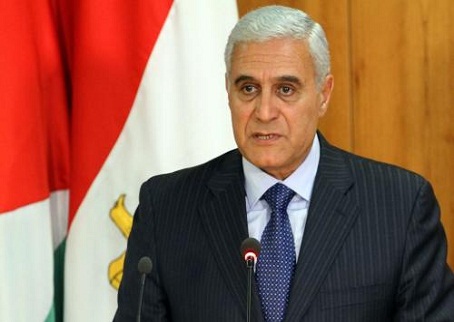
tahrirnews.com
On Wednesday 28th of September 2011, human rights activists Ahmed Seif al-Islam Hamad, Bahey eldin Hassan, and Khaled Ali Omar met with General Murad Muwaffi, Chief of Egyptian General Intelligence. The meeting was also attended by other national figures.
The human rights activists accepted the invitation to the meeting given the deteriorating human rights situation in the country, which requires a dialogue on the means to achieve reform and the best ways to make a clean break with repressive practices. In pursuit of improving the human rights situation, human activists attempt all necessary means, particularly official channels.
General Muwaffi provided an overview of the regional and international realities in which Egypt exists since the revolution, and expressed his interest in learning the views of the attendees, stating that his role is the careful communication of this discussion to Field Marshall Hussein Tantawi.
The attending human rights activists raised the followed observations and recommendations:
• The activists warned of the dangers of the current race to the power in Egypt and demanded swift democratic parliamentary and presidential elections, followed by an immediate handover of authority to those who would be elected by the Egyptian people.
• The activists recommended to the Supreme Council of the Armed Forces (SCAF)
• To abstain from involvement in the daily executive matters until elections are convened.
• To refrain from unilateral decision making and to establish an advisory council composed of civilians to operate with a clear mandate.
• To invest the ministerial cabinet and the Prime Minister with full executive authority, and to form a new cabinet with a new Prime Minister who has vision and political will to move out of the impasse.
• To put an end to the State of emergency and to end the referral of civilians to military trials.
• To issue an amnesty for the youth and other political activists that have been sentenced by military courts.
• The rights activists also requested the authorities:
• To issue the legislation on trade union freedoms.
• To ease the conditions for the establishment of political parties by reducing the number of founding members to 1000 persons only.
• To amend the Labor Law in a way that ensures security to workers, and protects them from arbitrary dismissal.
• To establish, without delay, a minimum and a maximum wage in order to minimize gaps of income.
• To provide permanent employment contracts to temporary workers of government agencies who have been employed (on short term contracts) for at least three years.
• To include the government’s so called ‘private funds’ in the State’s budget.
• To separate pension funds from the Finance Ministry and suspend legislation 135/2010, which is due to enter into force as of January 2012.
• To abide by court rulings and to half all delays by the authorities and public institutions in their enforcement, particularly the rulings that have invalidated privatization contracts and the sales of State-owned lands.
• To reject all pressures to amend the Tenders and Auctions Law, and to ensure accountability for those involved in drafting privatization contracts and the sales of State-owned lands.
• To adopt a plan for the revival of public-sector companies.
• To carry out international campaigns to clarify the court rulings that have rendered privatization contracts void, in response to the campaigns that have been led by businessmen that described these ruling as a return to nationalization; to expose the corruption in these deals and the elements that guided the Egyptian judiciary in its ruling.
• To dismiss the Public Prosecutor, his deputy, and the head of the State Security Prosecution.
• To investigate all cases of corruption related to the privatization process and the sale of State-owned lands, and to refer those involved to criminal courts. This is an essential step to increase Egypt’s chances in winning the claims expected to be filed by investors to courts of arbitration.
• To issue the Law of Judicial Authorities as approved by the Supreme Council of Judicial Authorities and its general assembly, without amendments from the SCAF.
The rights activists underlined that their observations represent a basic vision, and that their recommendations are basic steps that must be taken without delay, on any pretext or grounds, in order to bring tangible change to the human rights situation in Egypt. There remain many other steps and long-term institutional reforms that are necessary to give root to a human rights culture and make a clean break with repressive practices.
Share this Post

